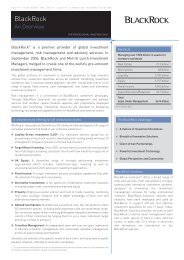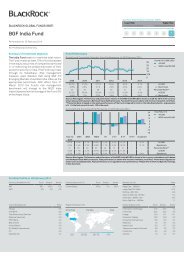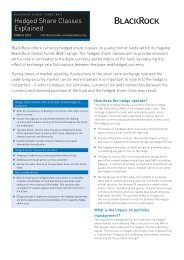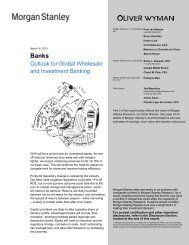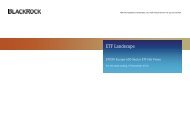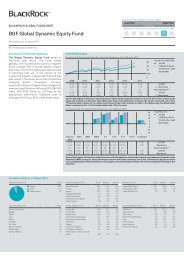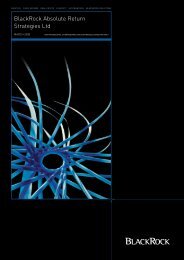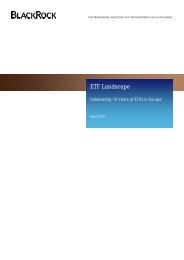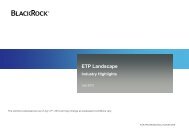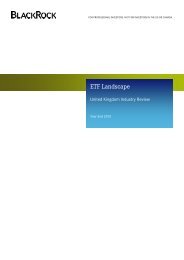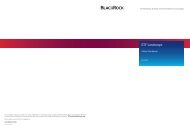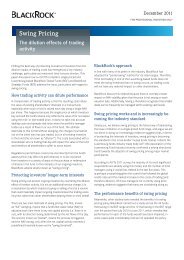Prospectus (4.96 Mb) - BlackRock International
Prospectus (4.96 Mb) - BlackRock International
Prospectus (4.96 Mb) - BlackRock International
You also want an ePaper? Increase the reach of your titles
YUMPU automatically turns print PDFs into web optimized ePapers that Google loves.
cyclical factors may reduce opportunities for the Investment Manager and the External Investment Advisors temporarily or<br />
permanently.<br />
In addition, it is possible that the Company may have exposure to the same investment or securities through more than<br />
one Fund Investment. Furthermore, the applicable External Investment Advisors could take opposing positions with<br />
respect to such securities and thus the Company’s exposure to such underlying security or investment could move against<br />
each other.<br />
INFORMATION TECHNOLOGY SYSTEMS<br />
The Company is dependent on the Investment Manager and the External Investment Advisors for investment<br />
management, operational and financial advisory services. The Company is also dependent on the Investment Manager for<br />
certain management services as well as back-office functions. The Investment Manager and the External Investment<br />
Advisors depend on information technology systems in order to assess investment opportunities, strategies and markets<br />
and to monitor and control risks for the Company and Fund Investments. Information technology systems are also used to<br />
trade in the underlying investments of the Fund Investments.<br />
It is possible that a failure of some kind which causes disruptions to these information technology systems could<br />
materially limit the Investment Manager’s or an External Investment Advisors’ ability to adequately assess and adjust<br />
investments, formulate strategies and provide adequate risk control. Any such information technology related difficulty<br />
could harm the performance of the Company.<br />
Further, failure of the back office functions of the Investment Manager to process trades in a timely fashion could<br />
prejudice the investment performance of the Company.<br />
SPECIFIC RISK FACTORS RELATING TO ABSOLUTE RETURN STRATEGIES<br />
The Company’s capital will primarily be allocated to External Investment Advisors pursuing a range of Absolute Return<br />
Strategies. Such strategies may involve investment in high risk securities including low credit quality and distressed<br />
securities, which may be illiquid, and use of highly speculative investment techniques including short-selling, investing in<br />
emerging market securities, high leverage, futures, swaps and notional principal contracts, currency speculation, shortsales<br />
and uncovered option transactions.<br />
CONCENTRATION OF INVESTMENT PORTFOLIO<br />
Because a Fund Investment may have the ability to concentrate its investments by investing an unlimited amount of its<br />
assets in a single issuer, sector, market, industry, strategy, country or geographic region, the overall adverse impact on<br />
such Fund Investment, and correspondingly on the Company, of adverse movements in the value of the securities of a<br />
single issuer, sector, market, industry, strategy, country or geographic region will be considerably greater than if such<br />
Fund Investment were not permitted to concentrate its investments to such an extent. By concentrating in a specific<br />
issuer, sector, market, industry, strategy, country or geographic region, a Fund Investment will be subject to the risks of<br />
that issuer, sector, market, industry, strategy, country or geographic region, such as rapid obsolescence of technology,<br />
sensitivity to regulatory changes, minimal barriers to entry and sensitivity to overall market swings, and may be more<br />
susceptible to risks associated with a single economic, political or regulatory circumstance or event than a more<br />
diversified portfolio might be. Moreover, a number of Fund Investments might accumulate positions in the same or related<br />
investment at the same time, compounding such risk. In addition, the Company is permitted to make direct investments,<br />
including, without limitation, in single security positions. It is possible for the Company to have a portion of its assets<br />
concentrated in a single issuer or security, and thus be subject to a similar concentration risk.<br />
SHORT-SELLING<br />
The Fund Investments may engage in short-selling. Short-selling involves selling securities which may or may not be<br />
owned and borrowing the same securities for delivery to the purchaser, with an obligation to replace the borrowed<br />
securities at a later date. Short-selling necessarily involves certain additional risks. However, if the short seller does not<br />
own the securities sold short (an uncovered short sale), the borrowed securities must be replaced by securities purchased<br />
at market prices in order to close out the short position, and any appreciation in the price of the borrowed securities<br />
would result in a loss. Uncovered short sales expose the Fund Investments to the risk of uncapped losses until a position<br />
can be closed out due to the lack of an upper limit on the price to which a security may rise. Purchasing securities to close<br />
out the short position can itself cause the price of the securities to rise further, thereby exacerbating the loss. There is the<br />
risk that the securities borrowed by a Fund Investment in connection with a short-sale must be returned to the securities<br />
lender on short notice. If a request for return of borrowed securities occurs at a time when other short-sellers of the<br />
security are receiving similar requests, a “short squeeze” can occur, and the Fund Investment may be compelled to<br />
replace borrowed securities previously sold short with purchases on the open market at the most disadvantageous time,<br />
possibly at prices significantly in excess of the proceeds received in originally selling the securities short.<br />
LOW CREDIT QUALITY SECURITIES<br />
Fund Investments may invest in particularly risky investments that also may offer the potential for correspondingly high<br />
returns. As a result, a Fund Investment may lose all or substantially all of its investment in any particular instance, which<br />
would have an adverse effect on the Company. In addition, there is no minimum credit standard which is a prerequisite to<br />
a Fund Investment’s acquisition of any security, and the debt securities in which a Fund Investment is permitted to invest<br />
16



